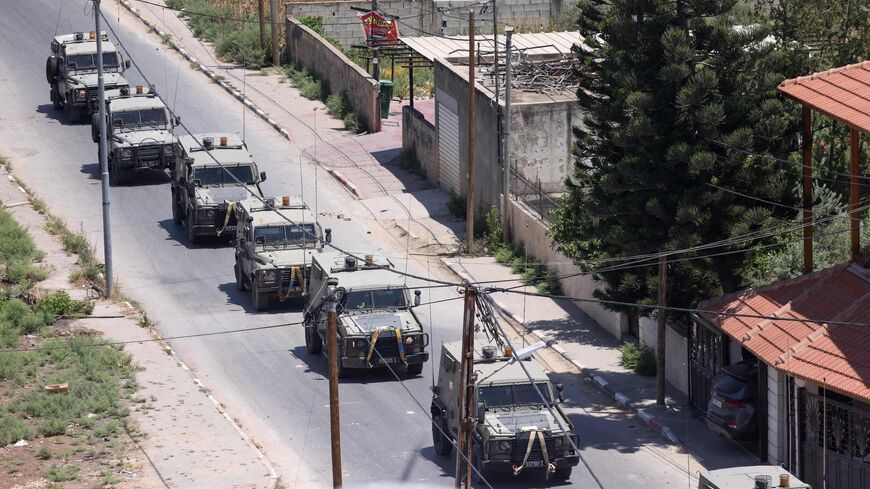TEL AVIV — The military strike that Israel launched at 1 a.m. Monday on the Jenin Palestinian refugee camp in the West Bank had been in the cards for months. Nonetheless, the drones that fired missiles at the joint command center of the Hamas and Islamic Jihad organizations caught the militant organizations by complete surprise.
The pre-dawn operation in the densely crowded enclave that has long been a hotbed of anti-Israel militant activity was the result of monthslong intelligence collection by the Shin Bet security agency and military intelligence.
Following the aerial missile strike, hundreds of troops, special forces, border police and other units backed by intense aerial cover swept into the narrow alleys of the camp, targeting the command center as well as weapons and explosives manufacturing sites. At least ten Palestinians were killed on the first day of the operation, and dozens were wounded. Israel said all were militants.
The current Israel Defense Forces (IDF) operation is unlikely to wipe out the militant infrastructure operating out of the camp. Still, Israel’s goal is to set it back and restore some of the deterrence it has lost in the northern West Bank in recent months.
At least 29 Israelis have been killed in dozens of shooting and bombing attacks by Palestinians in the first half of this year. According to Israeli figures, some 50 of the shooting attacks were planned in the Jenin camp, with militants taking advantage of the vacuum left by the official security forces of the Palestinian Authority (PA) that have lost control of the area.
A senior Israeli military source speaking to Al-Monitor on condition of anonymity attributed the loss of Israeli deterrence to the fact that many of the young Palestinians operating under the umbrella of Hamas and Islamic Jihad were born after the second intifada — the Palestinian uprising of 2000-2005 — and had not experienced the full force of the Israeli army. Hamas and Islamic Jihad, for their part, have not only taken advantage of the PA’s absence but also of the waning legitimacy of its leader, President Mahmoud Abbas.
The July 3 operation in Jenin was not a full-scale assault of the kind urged by hard-line members of the current government nor of periodic rounds of fighting with militants in the Gaza Strip. But it was different than the pinpointed raids that Israel has been conducting in recent months in Jenin and its environs, sending in special forces for several hours to find and detain suspected terrorists and thwart planned attacks. Israeli officials are calling it a “raid,” saying it would be limited to 48 or 72 hours.
Not only were the Palestinians surprised by the raid, but Israeli forces were amazed by the number of explosive devices and explosives laboratories they encountered.
“So far, we have seized over a ton of explosives in different forms,” a senior Israeli military source told Al-Monitor on condition of anonymity. "The infrastructure was well developed and scattered throughout the camp. There was a huge underground weapons depot that can be reached through a special shaft in a central mosque. I think now they understand that even a mosque will not grant immunity to terrorism."
The use of drone-fired missiles was the second time in recent weeks that Israel had resorted to this tactic, which it had avoided using for some 20 years. The ground forces deployed giant bulldozers to peel away the layers of asphalt covering the roads into the camp in order to detect roadside bombs of the type increasingly used by the Palestinian militants against Israeli troops, of which the Shin Bet has warned.
"So far, we have tried to avoid these measures," said the Israeli military source. "But we have reached a watershed that has proven that we have no choice. Since there is no law and order in this area, no governance … Israel is forced to use force to erode the militant infrastructure and reduce the level of violence.”
Barring complications, the operation is expected to end on July 4. Israel has conveyed messages to Palestinian groups operating out of the Gaza Strip and southern Lebanon, warning of a tough response should they carry out their threats to attack Israel and avenge the deaths of their fellow militants in the West Bank.
"It all depends on what happens in Jenin," a senior Israeli security source told Al-Monitor on condition of anonymity. “As long as the losses are tolerable and proportionate, we believe there will be no expansion to other fronts. Even if there is, we are ready."
The last time residents of the Jenin camp experienced such extensive Israeli military activity was in 2002 when Israeli troops mounted a monthlong operation throughout the West Bank in a bid to stamp out militant activity. The bitterest fighting took place in Jenin, where 23 Israeli soldiers were killed, as were several hundred Palestinians.
An Israeli officer who took part in the 2002 operation, dubbed Defensive Shield, told Al-Monitor on condition of anonymity that conditions now are very different. "The (fighting) infrastructure is now less developed, and the general Palestinian population is not involved in terrorism yet. From the Israeli point of view, the current operation will probably not change the region as Defensive Shield did. Still, we hope it reduces the level of violence.”
According to the daily Maariv, Israel gave the United States advance warning of the upcoming operation but withheld information about the timing and methods other than to assure the Americans that it would do all it could to avoid civilian casualties, including officials of the PA.
In fact, Prime Minister Benjamin Netanyahu appears to have shifted his approach to the PA since US-mediated contacts with Saudi Arabia regarding normalization with Israel have been revived in recent months. Contrary to his longstanding policy of weakening the PA and strengthening Hamas in Gaza, Netanyahu is now stressing the importance of the PA’s continued survival.
Nonetheless, responding to the raid on Jenin, Abbas announced the cessation of security cooperation with Israel, as he has whenever Israel escalates its operations in Palestinian towns and villages. His announcement is hardly relevant given that security cooperation in Jenin and the northern West Bank has been almost nonexistent in recent years because of the PA’s growing loss of control over the area.








